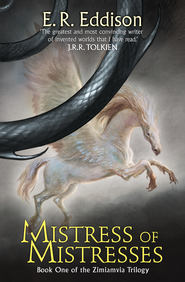По всем вопросам обращайтесь на: info@litportal.ru
(©) 2003-2024.
✖
The Mezentian Gate
Автор
Год написания книги
2019
Настройки чтения
Размер шрифта
Высота строк
Поля
‘Tell me, dear master,’ she said, drawing herself closer by a most unhuman self-elongating of body and limbs and rubbing her cheek, as might some cattish creature, against his knee.
He said, ‘You must not ask questions when you know the answer.’
Anthea sat back on her heels and laughed. Upon the motion, her hair, loosely bound up with a string of clouded zircon stones of that translucent blue which is in the lip of an ice-cave looked up to from within, fell, in tumbled cataracts as of very sunlight, down about her shoulders and, in one of its uncoiling fulvid streams, over her breast. ‘She Herself does not know the answer. I suppose, in this present dress of Hers, She is asleep?’
‘In this present dress,’ said the ancient doctor, ‘She is turned outward from Herself. You may, if you choose, conceive it as a kind of sleep: a kind of forgetting. As the sunshine were to forget itself in the thing it shines on.’
‘In that lion-cub of hers? I cannot understand such a forgetting in Her.’
‘No, my oread. Nor I would not wish you able to understand it, for that were to maculate the purity of your own proper nature.’
‘And you would wish me be as I am?’
‘Yes,’ answered he. ‘You, and all true beings else.’
The girl, silent, putting up her hair, met his look unsmilingly with her unquiet, feline, burning eyes.
‘We will go on,’ said the doctor, rising from his seat.
Anthea with a lithe and sinuous grace rose to follow him.
‘Whither?’ she asked as they came southward.
‘Up to Teremne. We will look upon these festivities.’
In the old Teremnene palace which, like an eagle’s nest, crowns the summit ridge of the south-eastern and loftier of the twin steep rock bastions called Teremne and Mehisbon, on and about which has grown up as by accretion of ages Rialmar town, is a little secret garden pleasaunce. It lies square between walls and the living rock, in good shelter from the unkinder winds but open to the sun, this side or that, from fore-noon till late evening. No prying windows overlook it: no intrusive noises visit it of the world’s stir without: a very formal garden artificially devised with paved walks of granite trod smooth by the use of centuries, and with flights of steps going down at either side and at either end to an oval pond in the midst, and upon a pedestal in the midst of that pond a chryselephantine statue of Aphrodite as rising from the sea. At set paces there were parterres of tiny mountain plants: stonecrop, houseleek, rock madwort, mountain dryas, trefoils, and the little yellow mountain poppy; and with these that creeping evening primrose, which lifts up wavy-edged four-lobed saucers of a spectral whiteness, new every night at night-fall, to bloom through the hours of dark and fill the garden with an overmastering sharp sweetness. And at full morning they droop and begin to furl their petals, suffused now with pink colour which were white as a snowdrop’s, and lose all their scent, and the thing waits lifeless and inert till night shall return again and wake it to virgin-new delicacy and deliciousness. This was Queen Stateira’s garden, furnished out anew for her sake seven years ago by Mardanus her lord, who in those days made little store of gardens, but much of his young new-wedded wife.
Shadows were lengthening now, as afternoon drew towards evening. In one of the deep embrasures of the east wall which look down the precipice sheer eight hundred feet, to the river mouth and the harbour and so through skyey distances to the great mountain chains, so blanketed at this hour with cloud that hard it was to discern snowfield from cloudbank, leaned King Mardanus in close talk with two or three about him. No wind stirred in the garden, and the spring sunshine rested warm on their shoulders.
Away from them at some twenty yards’ remove, by the waterside, upon a bench of lapis lazuli and mother-of-pearl, sat the Queen. The brightness of the sun shining from behind her obscured her features under a veiling mystery, but not to conceal an ambiency of beauty that lived in her whole frame and posture, an easefulness and reposefulness of unselfregarding grace. The light kindled to flame the native fire-colours in her hair, and the thrown shadow of that statue touched the furred hem of her skirt and the gold-woven lace-work on her shoe.
Over against her on the same bench the Lady Marescia Parry, only child of Prince Garman of Fingiswold, and so cousin german to the King, faced the sun. She was at this time in the twenty-fourth year of her age: of a dazzling whiteness of skin: her eyes, busy, bold and eager, of a hot chestnut brown: her nose a falcon’s, her yellow hair, strained back from her high forehead by a thin silver circlet garnished with stone and pearls, fell loose and untressed about her back and powerful shoulders, in fashion of a bride’s.
The Queen spoke: ‘Well, cousin, you are wedded.’
‘Well wedded, but not yet bedded.’
‘’Las, when mean you to give over that ill custom of yours?’
‘Ill custom?’
‘Ever to speak broad.’
‘O, between kinsfolk. Tell me unfeignedly, what thinks your highness of my Supervius? Is a not a proper man?’
‘He belieth not his picture. And since ’twas his picture you fell in love with, and he with yours, I dare say you have gotten the husband of your choice.’
The Princess smiled with her lips: cherry-red lips, lickerous, and masterful. ‘And by right of conquest,’ she said. ‘That sauceth my dish: most prickingly.’
‘Yet remember,’ said the Queen, ‘we wives are seldom conquerors beyond first se’nnight.’
‘I’ll talk to your highness of that hereafter. But I spake not of conquest upon him. My blood tells me there’s fire enough in the pair of us to outburn such cold-hearth rivalries as that. Dear Gods forfend I should e’er yield myself chattel to the man I wed: but neither could I be fool enough to wed with such a man as I could bring down to be chattel of mine. Nay, I spoke of my parents; ay, and (with respect) of yourself, and of the King.’
‘Your conquest there,’ replied the Queen, ‘is measure of our love of you.’
‘Doubtless. But measure, besides, of mine own self will. Without that,’ here she glanced over her shoulder and leaned a little nearer, ‘I am apt to think your love of me (the King’s, at least) had played second fiddle to more deeper policies.’
The Queen said, ‘Well, fret not for that. You have had your way.’
Marescia lifted her superb white chin and her mouth smiled. ‘Truly, cousin,’ she said, managing her voice almost to a whisper, ‘I think you are to thank me, all of you. Put case I had fallen in with your fine design to match me to yonder outed Prince of Akkama. The man is well enough: personable, I grant: qualified out of all ho, I’d swear, to please a woman: but of what avail? With’s father dead, and himself, driven away by the usurper, a landless exile still sitting on your door-step here. How shall such an one be ever a king, or lord of aught save’s own empty imaginings and discontents? I swear the King (Gods send he live for ever) may get better purchase by this that, following my own natural lust o’ the eye, I have brought him, than by Aktor, be he ten times prince indeed. And Rerek, far nearer us in blood and custom. Wed with yonder foreign lick-dish! God’s dignity, I’d sleep in the byre sooner and breed minotaurs.’
Queen Stateira laughed: honest lovely laughter, bred of sweet blood and the life-breath fancy free; ‘Come, you’re too bitter.’
‘Aktor is in your highness’s books, I think.’
‘Why think that?’
‘Strange else, professing so much cousinly love to me, you should a wished me give my hand there.’
The Queen looked away. ‘To tell you true, dear Marescia, ’twas the King’s wish, and but therefore mine, as being my duty.’
‘Duty?’ said the Princess: ‘to be led blindfold by your husband? Go, they’ll ne’er call me perfect wife a those terms.’
There was a pause. Then Marescia, sitting back again, her voice now at its ordinary strength and pitch: ‘What is this prognosticator by the stars, this soothsayer, your highness keeps i’ the palace?’
‘What do you mean? I keep none such.’
‘O yes: a greybeard signior: long gaberdine, and capped magister artium: some compliment-monger, I would wager. Comes to me as I passed among the throng of guests not half an hour since on my Lord Supervius’s arm, gives me a stare o’ the eye turned all my backside to gooseflesh, and crieth out that I shall bear Supervius a son shall be greater than his father.’
‘Heaven hold fast the omen,’
‘And then to my Lord Emmius, whom I must now call brother-in-law: crieth out and saith that of the seed of Emmius Parry shall come both a queen of earth and a queen of heaven.’
‘And what will he cry out at me, think you?’ said the Queen.
‘Please you enter the hall of the Sea Horses, I can show him to you, and you may examine him.’
‘Dear my Lord,’ said Stateira, as the King and those about him, their business being it seemed concluded, approached her, ‘here’s diversion for you,’ and told him what Marescia had said. The King bluffly humouring it as child’s talk, assented.
‘Yonder standeth the old man: there, that tall, lanky one,’ Marescia said in the Queen’s ear, from behind, as they descended the great staircase into that vast hall and paused upon the last steps between the two sea-horses of dark blue rock-crystal well the height of a man’s shoulder, there to take their stand and survey the company that, upon sounding of trumpets to a sennet to proclaim the King’s presence, abode all motionless now and with all faces turned that way: ‘and the girl with beastly eyes,’ she said, ‘who is, I suppose his granddaughter. Or, may hap, his bona roba, if such a jack pudding have use or custom of such commodities.’
Supervius eyed his princess with the deepening satisfaction of a skilled rider who begins to know the paces of a new high-blooded but untried mare. ‘Speak within door, Marescia,’ said her father. The King sent a little page of his of six year old that was named Jeronimy, to bring the doctor before him.
When that was done, and Vandermast made his obeisance, the King surveyed him a while in silence: then said, ‘Who are you, old sir? Of my folk or an outlander?’
‘I am,’ answered he, ‘your serene highness’s life-long loyal faithful subject: my habitation many journeys from this, south on the Wold: my practice, that of a doctor in philosophy.’
‘And what make you here i’ the court?’








